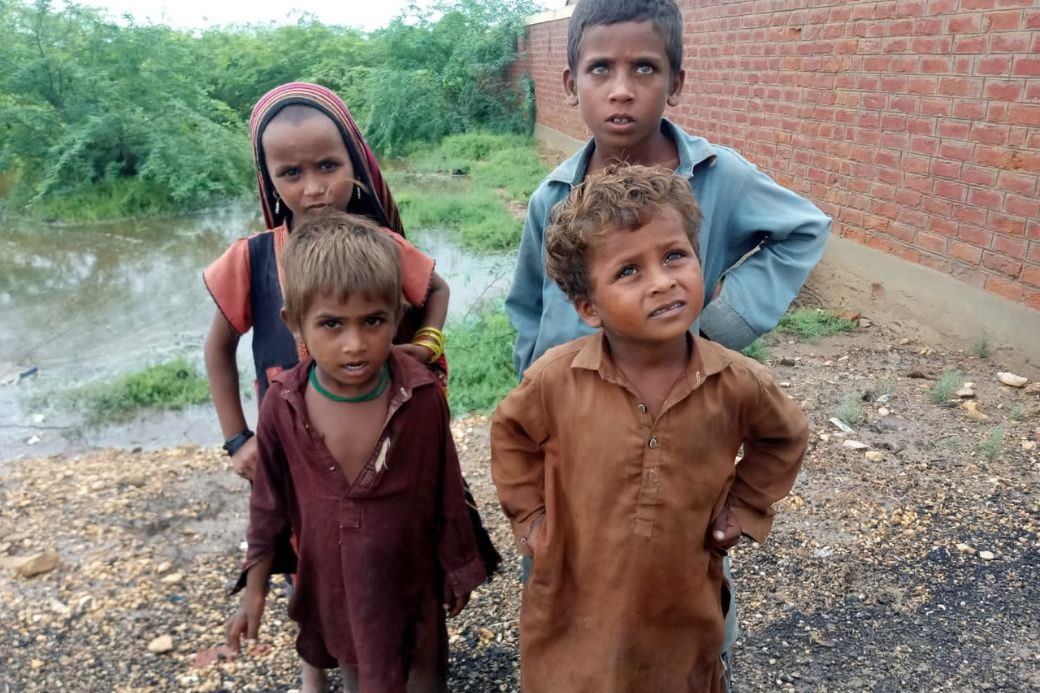According to the United Nations*, the last eight years have been the hottest ever: rising global temperatures and climate shocks are deepening the vulnerability of entire populations around the world, contributing to the escalation of a dangerous cycle of lack of livelihoods, increased displacement, and impact on the spread of disease.
In 2023 alone – declared the hottest year in history – 249 climate-related disasters hit the world, killing over 18,000 people, displacing 8.7 million and plunging 56.8 million people into food insecurity.
Among the countries most affected by the effects of climate change is Pakistan, where in 2022 torrential rains caused violent flooding that submerged a third of the country. More than 33 million people were affected by this extreme event, 8.2 million of whom had to leave their homes.
Among the hardest hit provinces was Sindh, where stagnant water and the destruction of drinking water sources led to an exponential increase in diseases such as malaria, dengue, cholera, acute diarrhoea and typhoid. Moreover, the risk of starvation remains high: the emergency has further aggravated the food situation in the region due to rising food prices, loss of livestock, fields and other income opportunities.
Ashraf, the head of a family of nine, is among the millions of people affected by the floods and says: “Before the floods, we lived peacefully. We had livestock and sold milk to earn money. When the floods hit, we had to leave our homes in the middle of the night. We carried our children on logs through the water. We lost everything,’ he concludes. Hameeda also saw her life shattered “The waters flooded our houses at night. In a few minutes, everything was submerged. The roof collapsed. We took our children and ran away. My husband went to look for work and has not returned since. Our livestock was lost. We don’t even have flour. We have no money and we do not know how to provide food every day for our children,” she says in tears.
CESVI intervened in this emergency from the earliest stages with the support of the European Union (DG ECHO), launching the ‘Humanitarian Assistance for Vulnerable Communities Affected by the Floods in Pakistan’ project, which brought life-saving aid and started the first phase of reconstruction.
Around 81,000 people received financial support in the initial stages to address their immediate humanitarian needs. In cooperation with the Danish Emergency Management Agency (DEMA), working within the framework of the EU intervention, almost 90,000 people had access to drinking water through the restoration of damaged sources. More than 25,000 beneficiaries had access to emergency sanitation, and some 8,000 families benefited from the rehabilitation of their household facilities.
Of great importance in the intervention was the promotion of hygiene both through awareness-raising campaigns and through the provision of personal hygiene items including kits for women (156,000 people supported).
Added to this is the support for reconstruction with the distribution of more than 9,300 ad hoc kits.
But the emergency that started in 2022 also extended in 2023 to Punjab, where more than 750,000 people were affected by a new monsoon season with extreme rains: more than 630,000 people were displaced, 42,000 houses were damaged or destroyed and almost half a million acres of crops were damaged.
Again, with the support of the European Union, CESVI immediately provided financial support by distributing water and hygiene kits to mitigate the risk of water-borne diseases in the area.
In total, CESVI can assist more than 220,000 people through this project.
* Global Humanitarian Overview 2024
